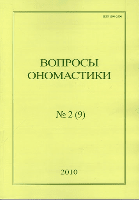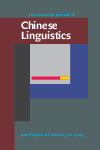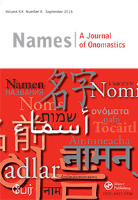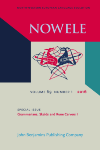
Voprosy Onomastiki-Problems of Onomastics
metrics 2024
Exploring the Essence of Names and Identity
Introduction
Voprosy Onomastiki-Problems of Onomastics is a distinguished open-access journal published by URAL FEDERAL UNIVERSITY that has been at the forefront of onomastic studies since its inception. With a dedicated ISSN of 1994-2400 and E-ISSN 1994-2451, the journal serves as a critical platform for researchers and practitioners engaged in the fields of linguistics, communication, and sociolinguistics, particularly in analyzing the significance of names and their impact on culture and society. As of 2023, it proudly holds a Q3 ranking in Communication and a Q2 ranking in Linguistics and Language, highlighting its vital role in advancing scholarly discourse. The journal's Scopus rankings further underscore its relevance within the arts and humanities, positioning it as an essential resource for academics keen on exploring the intersections of language, identity, and society. With open access since 2014, Voprosy Onomastiki ensures that its valuable content is readily available to a global audience, thereby fostering a rich exchange of ideas and findings in onomastics.
Metrics 2024
 0.19
0.19 0.20
0.20 0.30
0.30 6
6Metrics History
Rank 2024
Scopus
JCI (Web Of Science)
Quartile History
Similar Journals

International Journal of Chinese Linguistics
Exploring the Depths of Chinese LinguisticsInternational Journal of Chinese Linguistics is a distinguished publication that delves into various aspects of linguistic studies pertaining to the Chinese language. Published by John Benjamins Publishing Co, this journal stands out for its commitment to advancing the knowledge and understanding of Chinese linguistics within the global academic community. With an impact factor that places it in the Q2 quartile of linguistics and language, the journal is indexed in prominent databases, achieving ranks of #501 in Arts and Humanities and #580 in Social Sciences. These rankings reflect the journal's dedication to maintaining high scholarly standards and its relevance in both linguistic research and practical applications. While not categorized as Open Access, the journal provides necessary access through institutional subscriptions, thereby ensuring that valuable research reaches a broad audience. Covering a wide range of topics from syntax and phonetics to sociolinguistics and applied linguistics, the International Journal of Chinese Linguistics serves as an essential resource for researchers, professionals, and students seeking to deepen their understanding of the intricate relationship between language and culture in the Chinese context. With converging years from 2019 to 2024, it continues to evolve, reflecting ongoing developments in the field.

CogniTextes
Innovating Cognitive Linguistics for a Global Audience.CogniTextes (ISSN: 1958-5322) is an esteemed open access journal published by the Association Française de Linguistique Cognitive, dedicated to the exploration of cognitive linguistics and its intersection with textual interpretation. Since its inception in 2007, CogniTextes has been a vital platform for disseminating cutting-edge research that delves into the cognitive processes underlying language use, enhancing our understanding of linguistics in a cognitive context. This journal not only fosters scholarly communication among researchers and professionals but also serves as a valuable resource for students keen on advancing their knowledge in cognitive linguistics. With its headquarters located at the University of Lille 3 in France, CogniTextes encourages contributions from a diverse spectrum of disciplines, thereby enriching the field of linguistics and cognitive studies. The journal's commitment to open access ensures that its findings are readily available to a global audience, thus facilitating knowledge sharing and academic discourse.

Concentric-Studies in Linguistics
Elevating academic dialogue in the field of linguistics.Concentric-Studies in Linguistics is a distinguished journal published by the National Taiwan Normal University, College of International Studies & Social Sciences. With an ISSN of 1810-7478 and an E-ISSN of 2589-5230, this journal contributes significantly to the field of linguistics, encompassing a wide range of topics from language acquisition to sociolinguistics. As of 2023, it holds a respectable Q3 ranking in both the Linguistics and Language categories, and it is positioned in the 28th and 24th percentiles within its Scopus ranks for the Arts and Humanities and Social Sciences, respectively. Although it operates under a traditional access model, its publication from 2014 to 2024 reflects a commitment to advancing academic discourse. Researchers, professionals, and students are encouraged to engage with its rich content as it provides a platform for innovative studies and critical analyses that push the boundaries of linguistic research.

REVUE DE LINGUISTIQUE ROMANE
Deepening Understanding of Linguistic StructuresREVUE DE LINGUISTIQUE ROMANE, published by the esteemed SOCIÉTÉ LINGUISTIQUE ROMANE, is a prominent academic journal dedicated to the exploration of Romance linguistics. With its ISSN 0035-1458, the journal plays a significant role in advancing knowledge within the fields of linguistics and the history and philosophy of science. Although it does not currently offer Open Access, it provides critical insights and peer-reviewed research that are indispensable for scholars, educators, and students interested in the nuances of Romance languages. The journal, which has seen converged coverage from 2006 to 2017, and then again from 2019 to 2021, is ranked in the third quartile (Q3) across various categories within Scopus, reflecting its established presence in the academic community. As a vital resource for interdisciplinary studies, REVUE DE LINGUISTIQUE ROMANE is instrumental for those seeking to deepen their understanding of linguistic structures, cultural nuances, and the historical development of Romance languages.

Revista Virtual de Estudos da Linguagem-ReVEL
Fostering Global Dialogue in LinguisticsRevista Virtual de Estudos da Linguagem-ReVEL is a prominent academic journal dedicated to the field of linguistics, published by REVISTA VIRTUAL ESTUDOS LINGUAGEM in Brazil. With its ISSN 1678-8931, ReVEL aims to provide a platform for scholarly communication and dissemination of research across diverse areas of language studies, including sociolinguistics, language acquisition, and discourse analysis. As an open-access journal, it fosters accessibility to important linguistic research, allowing researchers, educators, and students alike to engage with the latest findings without subscription barriers. The journal’s focus on innovative methodologies and interdisciplinary approaches makes it a valuable resource for those seeking to deepen their understanding of language dynamics in various contexts. By contributing to the growing body of knowledge in this field, ReVEL plays a crucial role in promoting scholarly dialogue and enhancing the visibility of Brazilian linguistic research on a global scale.

Acta Neophilologica
Elevating discourse in linguistics with premier scholarly contributions.Acta Neophilologica is a prestigious academic journal published by the University of Ljubljana, dedicated to advancing the field of linguistics and language studies. With its commitment to Open Access since 2010, this journal ensures that valuable research is readily accessible to a global audience, fostering innovation and collaboration among researchers, professionals, and students alike. Recognized in the 2023 Quartiles as Q1 in Linguistics and Language, Acta Neophilologica stands out as a premier platform for scholarly contributions that explore various dimensions of language, linguistics, and their societal impacts. The journal is indexed in Scopus, which reinforces its reputation within the academic community, ranking 588 out of 1088 in the Arts and Humanities category and 672 out of 1167 in Social Sciences. Researchers seeking to publish their work in a highly regarded outlet will find Acta Neophilologica a valuable forum for sharing their insights and findings, ensuring that their research reaches an engaged and knowledgeable readership.

Names-A Journal of Onomastics
Connecting Cultures One Name at a TimeNames: A Journal of Onomastics, published by the University of Pittsburgh, University Library System, is a premier platform for scholars and practitioners in the fields of onomastics, linguistics, and demography. With an impactful open-access approach since 2021, this journal fosters greater accessibility to high-quality research and discourse in the critical study of names and their implications across cultures and societies. Celebrated for its rigorous scholarly contributions, Names has earned notable rankings, including Q1 in Linguistics and Language and Q2 in Demography for 2023, signaling its importance in shaping contemporary research dialogues. Covering a wide scope from 1953 to 2024, it provides a vital resource for researchers, professionals, and students alike, dedicated to advancing knowledge and promoting interdisciplinary dialogues within these dynamic fields.

Journal of Greek Linguistics
Championing the Study of Greek Language and Its ImpactThe Journal of Greek Linguistics, published by BRILL, is a premier platform dedicated to advancing the study of Greek language and its historical and contemporary implications within the broader field of linguistics. With an impact factor recognized in the linguistics community, this journal significantly contributes to the academic discourse surrounding Greek linguistics and its relevance in cultural and social studies. First made open access in 2016, it is now accessible to a global audience, facilitating a collaborative environment for researchers, scholars, professionals, and students alike. The journal is proudly positioned in the Q2 quartile for linguistics and language, reflecting its esteemed standing in the academic community, and it ranks within the top 30% in both the Arts and Humanities and Social Sciences categories according to Scopus. With a focus on the intersection of language, culture, and society, the journal invites contributions that offer new insights and promote interdisciplinary research. The Journal of Greek Linguistics continues to be an essential resource for those engaged in the rich and evolving conversation about the Greek language.

Lege Artis-Language Yesterday Today Tomorrow
Advancing Understanding of Language's Cultural ImpactLege Artis: Language Yesterday Today Tomorrow is a pivotal open access journal dedicated to the dynamic and multifaceted study of language, linguistics, and communication in contemporary society. Published by the esteemed University of SS Cyril & Methodius in Trnava, Slovakia, this journal serves as a vital platform for scholars and practitioners to explore the evolution of language and its impact on culture and society. With an ISSN of 2453-8035, Lege Artis has embraced open access since 2016, ensuring that its valuable research findings are freely available to all, thus promoting wider dissemination and engagement within the academic community. The journal invites contributions that enrich the understanding of linguistic theory, historical linguistics, sociolinguistics, and applied linguistics, making it an essential resource for researchers, educators, and students alike. By fostering an interdisciplinary approach, Lege Artis aims to contribute significantly to our understanding of language as a living entity, continuously evolving and adapting to societal changes.

NOWELE-North-Western European Language Evolution
Connecting Scholars Through Language ResearchNOWELE-North-Western European Language Evolution, published by John Benjamins Publishing Co, serves as a vital platform for researchers and scholars interested in the evolution and dynamics of North-Western European languages. With an ISSN of 0108-8416 and an E-ISSN of 2212-9715, this journal has been contributing to the field of linguistics since its inception in 1983, with ongoing publications until 2024. Indexed in Scopus and classified in the Q3 category for Linguistics and Language, NOWELE is recognized for its rigorous academic standards and diverse contributions, ranking #485 out of 1088 in the Arts and Humanities category, and #566 out of 1167 in Social Sciences. The journal fosters an open dialogue within the linguistic community, presenting innovative research findings and theoretical advancements. Researchers, professionals, and students alike benefit from its systematic exploration of language evolution in the context of a rapidly changing global linguistic landscape.